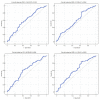Blood Count-Derived Inflammatory Markers and Acute Complications of Ischemic Heart Disease in Elderly Women
- PMID: 36835905
- PMCID: PMC9961980
- DOI: 10.3390/jcm12041369
Blood Count-Derived Inflammatory Markers and Acute Complications of Ischemic Heart Disease in Elderly Women
Abstract
Coronary artery disease (CAD) in women occurs later than in men. Underlying atherosclerosis, a chronic process of lipoprotein deposition in arterial walls with a prominent inflammatory component, is influenced by several risk factors. In women, commonly used inflammatory markers are generally found to be related to the occurrence of acute coronary syndrome (ACS), as well as the development of other diseases that influence CAD. New inflammatory markers derived from total blood count-systemic inflammatory response index (SII), systemic inflammatory reaction index (SIRI), monocyte-lymphocyte ratio (MLR), platelet-lymphocyte ratio (PLR), and neutrophil-lymphocyte ratio (NLR)-were analyzed in the group of 244 elderly, postmenopausal women with the diagnosis of ACS or stable CAD. SII, SIRI, MLR, and NLR were significantly higher in women with ACS compared to those with stable CAD (p < 0.05 for all)-the highest values were observed in women with NSTEMI. MLR from new inflammatory markers, HDL, and history of MI turned out to be significant factors associated with ACS. These results suggest that MLR as representative of blood count-derived inflammatory markers may be considered as additional CVD risk factors in women with suspected ACS.
Keywords: acute coronary syndrome; monocyte-lymphocyte ratio; neutrophil-lymphocyte ratio; platelet-lymphocyte ratio; systemic inflammatory response index.
Conflict of interest statement
The authors declare no conflict of interest.
Figures
Similar articles
-
Association of inflammatory markers with all-cause mortality and cardiovascular mortality in postmenopausal women with osteoporosis or osteopenia.BMC Womens Health. 2023 Sep 14;23(1):487. doi: 10.1186/s12905-023-02631-6. BMC Womens Health. 2023. PMID: 37705033 Free PMC article.
-
The Predictive Role of Maternal Biological Markers and Inflammatory Scores NLR, PLR, MLR, SII, and SIRI for the Risk of Preterm Delivery.J Clin Med. 2022 Nov 26;11(23):6982. doi: 10.3390/jcm11236982. J Clin Med. 2022. PMID: 36498555 Free PMC article.
-
Investigation of the Associations of Novel Inflammatory Biomarkers-Systemic Inflammatory Index (SII) and Systemic Inflammatory Response Index (SIRI)-With the Severity of Coronary Artery Disease and Acute Coronary Syndrome Occurrence.Int J Mol Sci. 2022 Aug 23;23(17):9553. doi: 10.3390/ijms23179553. Int J Mol Sci. 2022. PMID: 36076952 Free PMC article.
-
Assessment of Inflammatory Hematological Ratios (NLR, PLR, MLR, LMR and Monocyte/HDL-Cholesterol Ratio) in Acute Myocardial Infarction and Particularities in Young Patients.Int J Mol Sci. 2023 Sep 21;24(18):14378. doi: 10.3390/ijms241814378. Int J Mol Sci. 2023. PMID: 37762680 Free PMC article. Review.
-
The Significance of Simple Inflammatory Markers in Off Pump Surgery-Review.Rev Cardiovasc Med. 2022 Dec 9;23(12):400. doi: 10.31083/j.rcm2312400. eCollection 2022 Dec. Rev Cardiovasc Med. 2022. PMID: 39076673 Free PMC article. Review.
Cited by
-
Study on the predictive value of laboratory inflammatory markers and blood count-derived inflammatory markers for disease severity and prognosis in COVID-19 patients: a study conducted at a university-affiliated infectious disease hospital.Ann Med. 2024 Dec;56(1):2415401. doi: 10.1080/07853890.2024.2415401. Epub 2024 Oct 24. Ann Med. 2024. PMID: 39444292 Free PMC article.
-
Correlations Between Acute Coronary Syndrome and Novel Inflammatory Markers (Systemic Immune-Inflammation Index, Systemic Inflammation Response Index, and Aggregate Index of Systemic Inflammation) in Patients with and without Diabetes or Prediabetes.J Inflamm Res. 2024 Apr 29;17:2623-2632. doi: 10.2147/JIR.S454117. eCollection 2024. J Inflamm Res. 2024. PMID: 38707954 Free PMC article.
-
Changing Face of Inflammatory Activation in Complex Coronary Artery Disease during the COVID-19 Pandemic.J Cardiovasc Dev Dis. 2023 Apr 30;10(5):199. doi: 10.3390/jcdd10050199. J Cardiovasc Dev Dis. 2023. PMID: 37233166 Free PMC article.
-
Prediction of Osteoporotic Hip Fracture Outcome: Comparative Accuracy of 27 Immune-Inflammatory-Metabolic Markers and Related Conceptual Issues.J Clin Med. 2024 Jul 7;13(13):3969. doi: 10.3390/jcm13133969. J Clin Med. 2024. PMID: 38999533 Free PMC article.
-
Prognostic value of the derived inflammatory marker SIRI in postmenopausal women with coronary artery disease.Front Cardiovasc Med. 2024 Dec 20;11:1418781. doi: 10.3389/fcvm.2024.1418781. eCollection 2024. Front Cardiovasc Med. 2024. PMID: 39759498 Free PMC article.
References
-
- Bairey Merz C.N., Johnson B.D., Sharaf B.L., Bittner V., Berga S.L., Braunstein G.D., Hodgson T.K., Matthews K.A., Pepine C.J., Reis S.E., et al. Hypoestrogenemia of hypothalamic origin and coronary artery disease in premenopausal women: A report from the NHLBI-sponsored WISE study. J. Am. Coll. Cardiol. 2003;41:413–419. doi: 10.1016/S0735-1097(02)02763-8. - DOI - PubMed
-
- Zhao D., Guallar E., Ouyang P., Subramanya V., Vaidya D., Ndumele C.E., Lima J.A., Allison M.A., Shah S.J., Bertoni A.G., et al. Endogenous Sex Hormones and Incident Cardiovascular Disease in Post-Menopausal Women. J. Am. Coll. Cardiol. 2018;71:2555–2566. doi: 10.1016/j.jacc.2018.01.083. - DOI - PMC - PubMed
Grants and funding
LinkOut - more resources
Full Text Sources
Miscellaneous



